Beyond Diesel: Fuel Filtration’s Bold New Era
Leave a Comment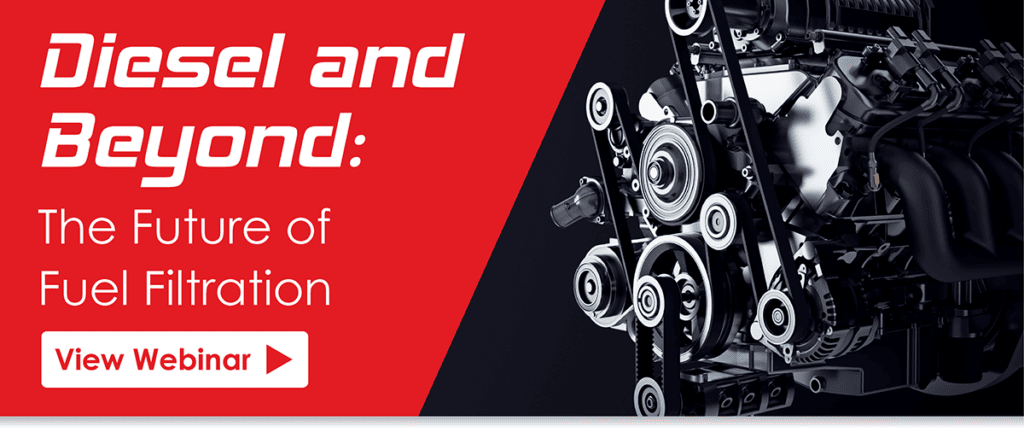
This article is based on a webinar conducted by Aaron Keck, a product manager in Schroeder Industries’ Fuel Filtration group. This insightful presentation is informed by Aaron’s 13 years of experience in the Diesel Power and Fluid Power Industries.
Click here to view the webinar!
Growing global energy demands are ‘fueling’ technological advancements in engines and driving the adoption of alternative energy sources. The ripple effect of this evolution has major implications for the filtration industry.
Given the speed of advancement and diversification of fuel sources, and the increasing desire for environmentally responsible energy consumption, what do the futures of diesel and fuel filtration look like?
Despite the growth of alternative fuel technology, all signs point to a continual refinement of diesel technology in tandem with developments in CNG, hydrogen, and electric power. The diversity of technology and fuel sources provide many avenues for new innovations.
1. The Diesel Engine is Here to Stay
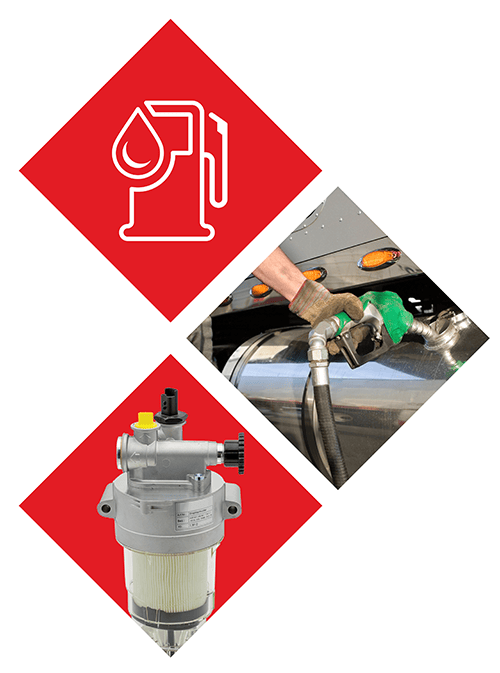
Electric engine technology has advanced by leaps and bounds, but industry sources indicate that all electric vehicles are still far off in many applications, from military to commercial.
According to a study conducted by the National Academies of Sciences, Engineering and Medicine examining military applications for electric vehicles, “…all-electric vehicles are not yet practical — at least through 2035.” Jeremy Harsin, the Global Construction Market Director for Cummins Inc., predicts that “In the off-highway space, diesel still has a long runway.”
A variety of factors contributes to the practicality of diesel engines over electric engines in the near term for various applications, including:
- Limited electric infrastructure.
Reliable electric power requires an expansive, efficient power grid. Especially for remote applications such as mining, the infrastructure to sustain such operations does not currently exist. - Lower energy density of current battery technology.
Pound for pound, current battery technology can’t match the energy density of diesel fuel, which is critical for consistent, reliable, long duty cycles. - Reliability concerns.
There’s a reason diesel is often a primary backup source for critical operations, processes, and services: Diesel’s proven reliability. In renewable, hybrid power generation systems, diesel is frequently integrated to make up for production shortfalls and periods of high demand.
A long runway for advancement in diesel technology still exists, even as electric and alternative energy technology adoption grows.
As liquid diesel engines evolve, filtration technology must adapt to enable efficient, clean operation. Major considerations include:
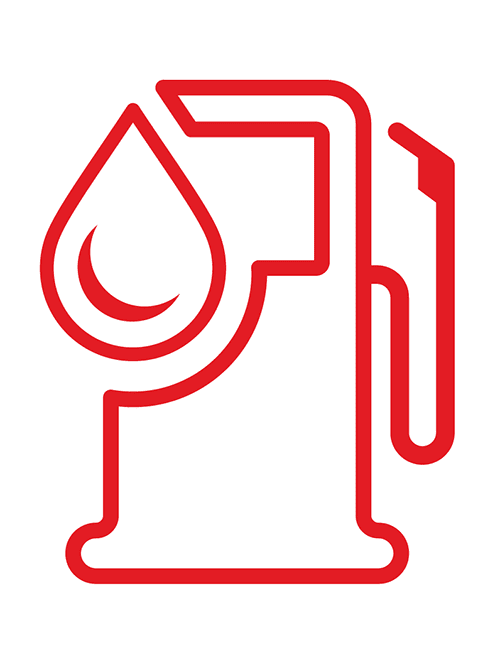
- The sensitivity of new fuel system designs.
Protecting system components from contamination is increasingly vital as components become more sensitive and precise. Eliminating as much contamination as possible is necessary for increasing component life, maintaining efficiency, and reducing emissions. - Changing fuel chemistry.
The adoption of biodiesel, diesel blends, and other sustainable fuel sources demands additional considerations in filter material selection. Choosing appropriate metals, coatings, and elastomers ensures that filtration components will not react adversely to changes in fuel chemistry. Rapid prototyping and modular testing are essential for keeping pace with chemical changes. - Maintaining system efficiency to reduce emissions.
Legislation and broader concerns regarding emissions and carbon footprints calls for filtration solutions that maximize system efficiency, increases energy efficiency, and reduce emissions.
2. Alternative Fuel Demand Will Grow
In the October 2022 Outlook for Energy Report from Exxon Mobil, there was an emphasis on the long-term reduced reliance on oil and shifting demand towards a variety of alternative fuel sources.
There are three key drivers of this trend:
- Technology.
As alternative fuel technology becomes more viable, affordable, and widespread, adoption increases. - Policy.
Legislation and environmental agreements on the global and national level, such as the 2015 Paris Agreement and the 2022 U.S. Inflation Reduction Act, provide incentives and regulations that drive alternative energy adoption and control emissions. - Consumer Preference.
Consumers are increasingly interested in alternative energy sources in their transportation and utilities. A Consumer Report survey conducted in 2018 found that 76% of U.S. residents agree that increasing renewable energy is a worthwhile goal. With technological innovation and government incentives increasing alternative energy accessibility, consumers may be more encouraged to support entities utilizing alternative energy sources or consider adopting alternative energy in their own lives.
While oil will remain a large source of global energy over the next 30 years, the growing shift to alternative fuel sources will drive new technology and demand new tailored filtration solutions.
3. Spotlight on Compressed Natural Gas
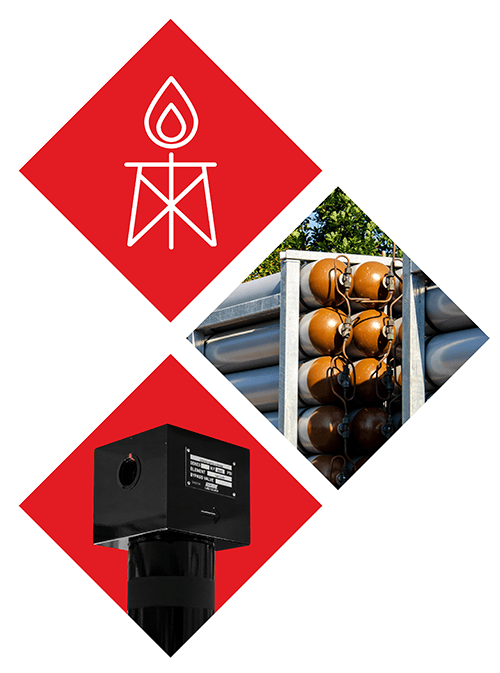
Compressed natural gas, or CNG, is one of the mostly widely used alternative fuel sources for lower emissions and requires specialized filtration solutions. Three major, interconnected applications for CNG filtration come with their own considerations:
- CNG Dispensing.
Commercial last-mile delivery and hub-and-spoke distribution models, which increasingly run on CNG for carbon footprint reduction, are driving an increase in CNG fueling stations.
Filtration solutions for this expanding infrastructure must maintain a low pressure drop while ensuring optimal filtration to provide consistently clean fuel to these fleets in a timely manner. - Virtual Pipelines.
For plants and operations far from existing natural gas pipelines, compressors are used to load CNG onto trailers, which are taken to remote industrial sites. This system is referred to as a ‘virtual pipeline.’
Reducing pressure drop is vital for reducing the energy consumption of these compressors and extending service intervals. Utilizing the latest gas filtration media in a layered, pleated construction, lower pressure drop and higher efficiency can be achieved versus traditional filtration setups typical to these applications. - Oil & Gas.
Dual-fuel technology, in which an engine is designed to operate on diesel and CNG, is regaining traction in the oil & gas industry and continues to evolve.
The intensity of oil & gas work environments calls for especially robust filtration solutions which maintain a low pressure drop and are small enough to maximize available space and accommodate two fuel systems. In many cases, appropriate surface treatments and the use of stainless-steel materials where possible are also required to prevent degradation in potentially corrosive environments.
4. Hydrogen Filtration and Transitional Technology Between Liquid Fuel and Electric-Powered Engines
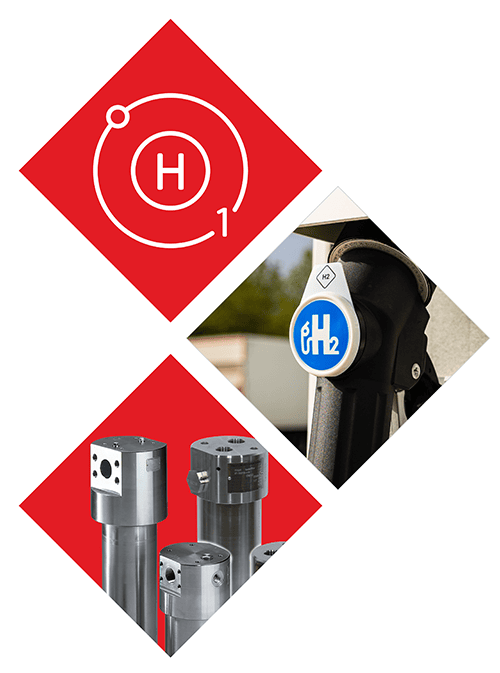
In the quest for electrification, hydrogen power is a critical stepping stone. Emitting only water vapor and small amounts of nitrous oxide, hydrogen power is a benchmark for eco-friendly alternative fuels.
In the spring of 2023, Cummins Inc. rocked the industry with the reveal of a fuel-agnostic 15L engine capable of running on hydrogen. This development illustrates that fuel-diversity is an attainable first step in transitioning away from liquid fueled engines and moving us closer to the infrastructure needed to support more alternative energy sources like hydrogen.
As with any fuel, filtration plays a key role in the performance of hydrogen-powered equipment and fuel cells at every stage:
- Manufacturing.
Filtration plays a key role in the manufacturing process, as component cleanliness of fuel cells and battery technology, to compressed gas storage tanks require extremely clean environments to ensure safe and reliable operation in the field. - Generation.
From the electrolysis process needed to produce the hydrogen, to the compression and storage of the hydrogen, the same requirements of removing contaminants during the handling and storage of the fuel parallel that of compressed gas. - Refueling.
Refueling points also require a level of filtration to ensure that the hydrogen introduced into a fuel cell maintains a high purity. - Charging.
The stationary equipment used to charge battery electric equipment, or the fuel cell electric equipment use some level of filtration for both the air used in the fuel cell, as well as the hydrogen fuel being consumed.
Developing hydrogen filtration solutions requires special considerations:
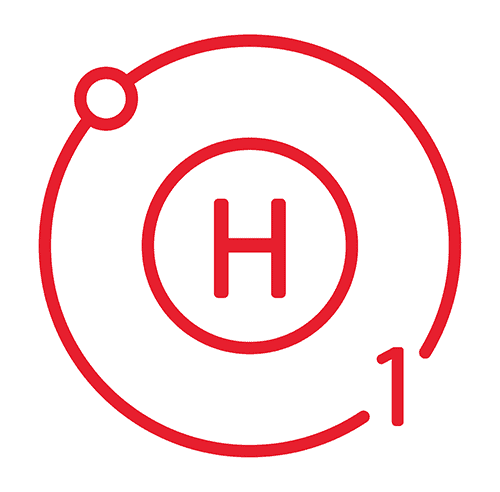
- Hydrogen embrittlement.
Solid metals will deteriorate in the presence of hydrogen, so material selection is extremely important for extending the integrity of filters and elements. - Hydrogen molecule size.
Hydrogen is an exceptionally small molecule compared to other filtered fuels. To secure the system and prevent leaks, seal designs need to be carefully selected and appropriate elastomers used to ensure a consistent, leak-free, and serviceable sealing surface. - Appropriate filter elements.
Traditional filter medias used for other liquids and gasses will not withstand the design requirements of hydrogen compression, transfer, storage, or dispensing. Stainless steel is a common choice for hydrogen elements to avoid electrostatic discharge. To prevent fiber migration into highly sensitive, high-pressure hydrogen system components, compressed metal fibers are a common choice for filter media.
Hydrogen presents an exciting, yet challenging avenue for expansion in the filtration industry where we will continue to push the limits of filtration and material science.
In Conclusion: No Linear Path for Fuel Filtration
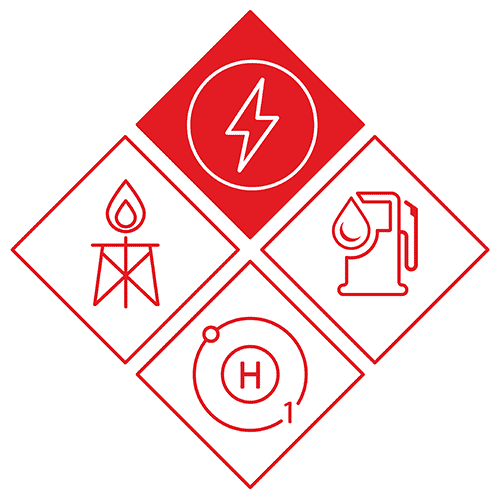
The future of fuels and fuel filtration will not be defined by a clear linear advancement towards renewable fuel sources.
Just as physical currency still exists alongside electronic payments and banking, our energy needs will continue to be satisfied by a range of fuel sources, including diesel and alternative fuels. Advancements in diesel and liquid fuel technologies must continue alongside alternative fuel developments.
Schroeder Industries: Your Source for Advanced Fuel Filtration
Schroeder Industries continues our 75+ year tradition of evolution and innovation, monitoring industry trends and developing advanced filtration solutions for virtually every application. Our solutions are engineered with consideration for ongoing technological advancements and changes in the diesel and alternative fuel landscape.






